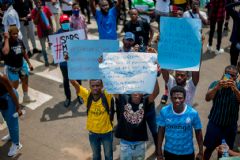Human Rights Voices
While the UN devotes its human rights operations to the demonization of the democratic state of Israel above all others and condemns the United States more often than the vast majority of non-democracies around the world, the voices of real victims around the world must be heard.
Nigeria, October 23, 2020
69 People Killed During Nigerian Protests Against Police Brutality
Original source
Nigerian President Muhammadu Buhari says 69 people have been killed in protests against police brutality that have rocked the country.
The fatalities include civilians, police officers and soldiers, he said.
Amnesty International said earlier this week that at least 56 people had died since the protests began, including 12 protesters killed in Lagos on Tuesday.
A group that has been key in organising the demonstrations has now urged people to stay at home.
The Feminist Coalition also advised people to follow any curfews that may be in place in their states.
The streets of Nigeria's biggest city, Lagos, the centre of the protests, have gone quiet but an atmosphere of fear remains.
The protests began on 7 October with mostly young people demanding the scrapping of a notorious police unit, the Special Anti-Robbery Squad (Sars).
The unit was dissolved days later, but the protests continued. They escalated after Tuesday's shooting, when rights group Amnesty International says security forces killed at least 12 people. Nigeria's army has denied any involvement.
President Buhari announced the death toll in a meeting with former Nigerian leaders on Friday. He said it included 51 civilians, 11 police officers and seven soldiers.
The previous night, the president made a short televised address in which he urged protesters to stop demonstrating and instead engage with the government "in finding solutions".
He faced criticism for not mentioning the Lagos shootings.

